2020 was a year like no other. With a ferocious bushfire season that ravaged the country followed by the COVID-19 pandemic – pharmacists were on the frontline every step of the way.
Here are some of the biggest events of the year, month-by-month.

January
It was a smoky start to 2020, with towns in the epicentre of fire zones decimated and dangerous particulates blanketing much of the country. Pharmacists worked long hours, sometimes needing to dispense medicines without prescriptions or payment. In New South Wales (NSW), the Chief Health Officer granted special authority for pharmacists to issue S4 medicines without a prescription.
Supplies of essential medicines soon ran low, and people with asthma were unable to purchase inhalers in some parts of the country.
One pharmacist in Mallacoota, Victoria told Australian Pharmacist of the difficulties managing stock: ‘At one point, I was dispensing only enough medications for a week if I felt that item was running low,’ said Mallacoota Pharmacy Pharmacist-in-Charge Emmanuel Pasura MPS.
‘Nothing prepares you for such a disaster.’
Meanwhile, at the tail end of the month, COVID-19 appeared on the international radar. At the time there were only six cases outside of Wuhan, China, with Australia’s Chief Medical Officer Professor Brendan Murphy saying the risk to the Australian public remained ‘relatively low’ and that the Department of Health was ‘alert but not alarmed’.

February
As COVID-19 cases began to climb, and deaths across the globe inched past 2000, pharmacists were urged to limit the number of face masks sold in the wake of customer stockpiling.
PSA President Chris Freeman advised: ‘While there is limited stock available from suppliers, we encourage pharmacists to only supply limited quantities of face masks to consumers, consistent with the immediate health needs of an individual person.’
Federal Minister for Health Greg Hunt and Prime Minister Scott Morrison pledged to keep the nation safe from harm.
‘[We’re] looking to the future and using the best minds we have available in this area, and they’re the best in the world, to ensure that we can put our best foot forward in keeping Australians safe,’ the prime minister said at the time.
Towards the end of the month, the Federal Government unveiled the nation’s ‘COVID-19 Plan’ (Australian Health Sector Emergency Response Plan for Novel Coronavirus), in preparation for a potential large-scale coronavirus outbreak.

March
Reports of the local spread of COVID-19 rattled Australians, as cases began to skyrocket overseas in hotspots such as Iran and Italy.
Stockpiling of medicines and supplies reached fever pitch, with empty pharmacy shelves prompting the Therapeutic Goods Administration to issue a statement urging an end the behaviour.
‘We call on consumers not to purchase more medicines than they need, and we urge health professionals to reassure patients that there is no need to buy more than is necessary,’ the statement said.
On the practice front, pharmacist vaccinations were expanded in NSW and Queensland to combat other communicable diseases. In both states, pharmacists can now provide influenza vaccinations for children as young as 10, while Queensland pharmacists are also able to administer travel vaccinations to those over 16.
It was also announced that electronic prescribing would be fast-tracked to stop the spread of COVID-19, and $25 million was allocated to fund home medicines services to protect those most vulnerable.

April
At the start of the month, Continued Dispensing was extended until the end of June.
The measure, which was put into place during bushfire season, allowed pharmacists to provide patients with up to 1 month’s supply of their usual medicine without a script.
In other developments, telehealth services were expanded via an amendment to PBS prescription requirements for telehealth consultations, with the announcement that pharmacists in Victoria and Western Australia can now supply Schedule 4 medicines via digital images of a prescription.
In unfortunate news, however, Tasmania was placed in stage 4 lockdown due to outbreaks linked to the Ruby Princess cruise ship and in the region’s hospitals. Pharmacies remained open and adapted to the restrictions to serve the community.
It was also reported that pharmacists on the frontline were experiencing aggression and violence as fear swept across the nation.
In Victoria, police said there had been a 116% increase in assaults and a 200% increase in reports of threatening behaviour by customers.

May
The rollout of electronic prescriptions dominated the month of May, with the nation’s first e-prescription dispensed in Victoria.
Of the groundbreaking development, A/Prof Freeman said: ‘Unlike digital image prescriptions, which are (sometimes poor quality) electronic reproductions of paper prescriptions, electronic prescriptions are completely paperless and will reduce transcription and interpretation errors.’
The PSA also established a dedicated support line to assist pharmacists with queries around e-prescriptions.
‘I would urge any pharmacist or pharmacy support staff member to utilise the support line, which will not only benefit them but in turn help pharmacies better educate their patients and members of the public on how electronic prescriptions work,’ A/Prof Freeman said.
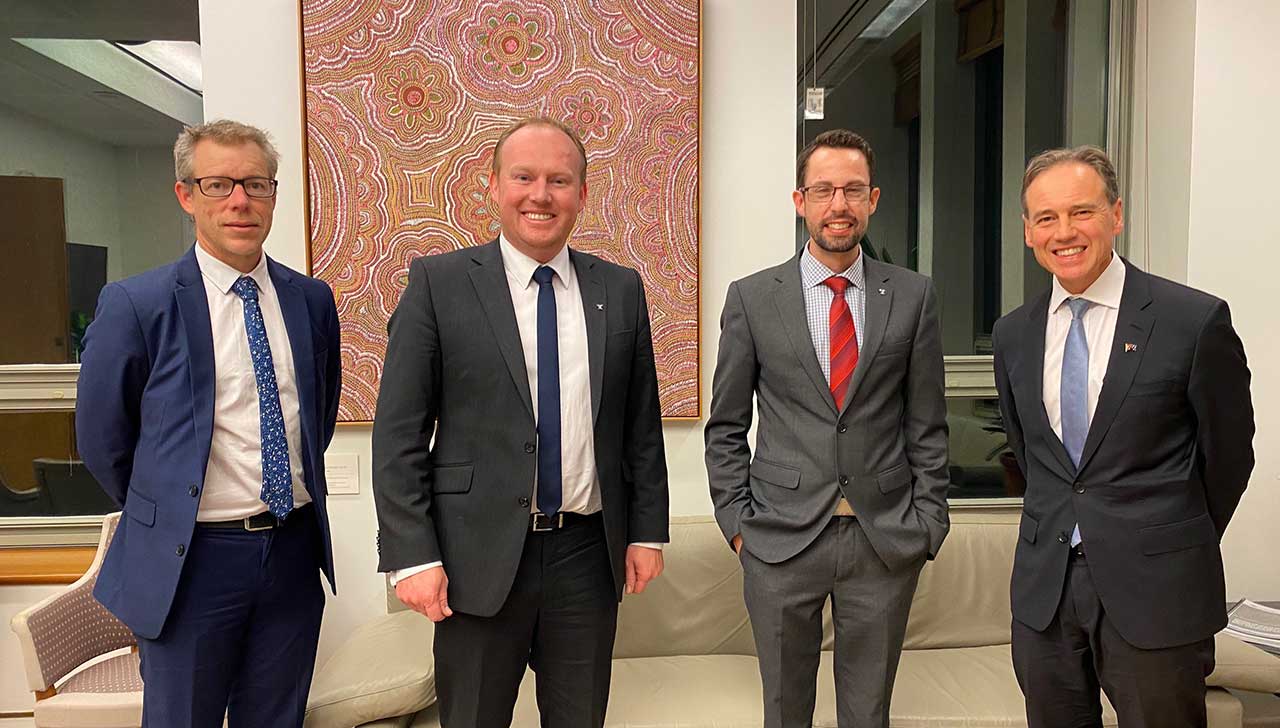
June
The PSA became a first-time co-signatory to a Community Pharmacy Agreement (CPA) when the 7CPA was signed in mid-June. New developments in the agreement included plans to introduce ’60-day dispensing’, an increase in funding for professional programs and policy updates in aged care and mental health.
At the signing of the agreement, Minister Hunt praised pharmacists for their ‘central role’ in supporting the community through the bushfires and pandemic.
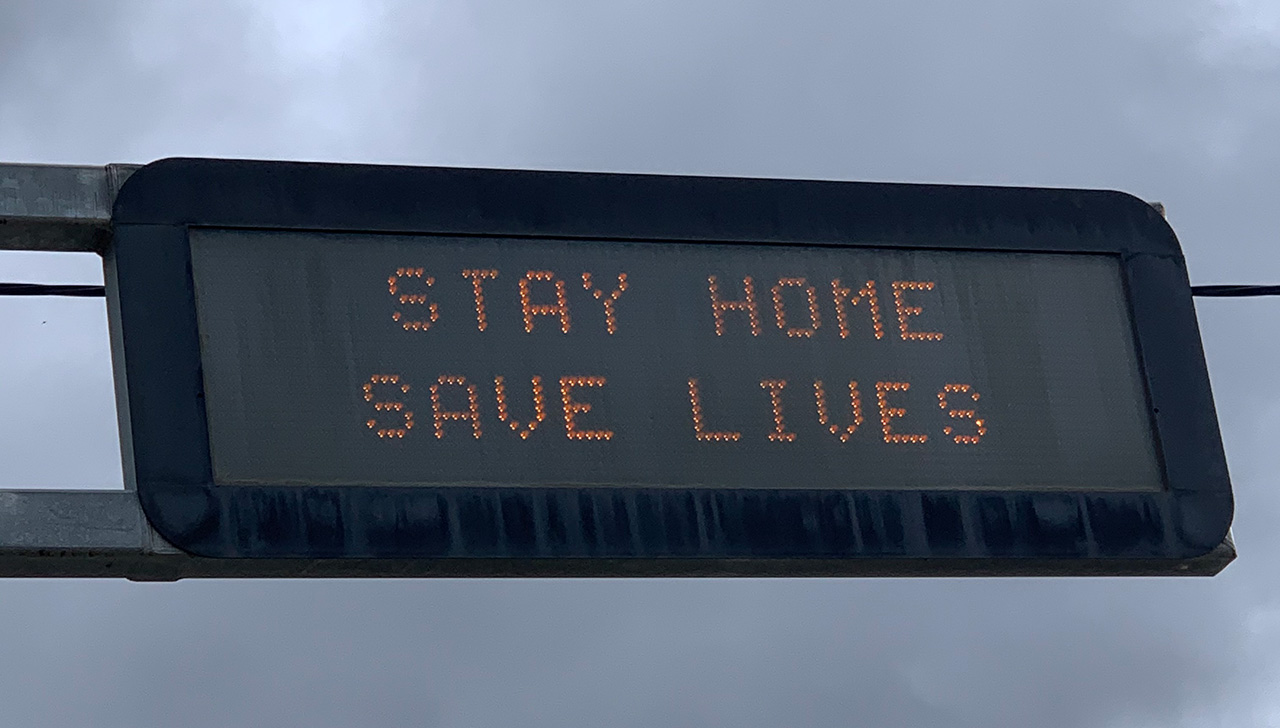
July
While most of the country had a reprieve from the spread of COVID-19, Victoria experienced a second wave that would throw the state into months of stage three and, later, stage four restrictions.
Daily cases and deaths climbed to record highs, causing anxiety in the community. Pharmacists were forced to adapt quickly to the operating changes and demands for their services.
‘[The] challenges we’ve faced are constant regulatory changes, sudden drastic changes in workflow and procedures for social distancing,’ Mr Cameron Walls MPS, Pharmacist Manager at United Chemists Wodonga on the Victorian told AP at the time.
For the second time, Continued Dispensing Arrangements were extended as the crisis in Victoria continued to unfold.
COVID-19 swept through the state’s aged care facilities, with news of 800 residents in this vulnerable group being infected with the virus.

August
The PSA’s submission to the Royal Commission into Violence, Abuse, Neglect and Exploitation of People with Disability was published this month. The issues paper contained 13 recommendations ranging from data collection and reporting, pharmacists’ role in ensuring the quality use of medicines (QUM) and the need for funding so QUM services can be delivered.
‘Pharmacists must be involved in the care of people whenever medicines are included as a component of their health management plan,’ A/Prof Freeman said.
As the Queensland Government revealed its intention to launch COVID-19 testing in the state’s pharmacies, A/Prof Freeman and Pharmacy Guild of Australia Queensland Branch Director Gerard Benedet expressed their concern.
A/Prof Freeman said it sent out ‘the wrong message’ to customers, while Mr Benedet said the decision would put pharmacists at risk of infection.

September
At the start of spring, it was announced that Continued Dispensing would be extended yet again until March 2021. A/Prof Freeman urged the government to make the arrangement permanent.
‘With COVID-19 still posing considerable risk in parts of Australia, these arrangements are important to ensure Australians can continue to safely access essential medicines,’ he said.
As the Royal Commission into Violence, Abuse, Neglect and Exploitation of People with Disability continued, pharmacist Dr Manya Angley FPS told the hearing about the risk of psychotropic use in this group.
‘If a person is prescribed a medication that is not an absolute last resort, then that person has been denied their right to have proper intervention and care,’ she said.
‘I also think that if they are solely prescribed because of their sedative effects, rather than addressing the underlying problems, then that is abuse.’
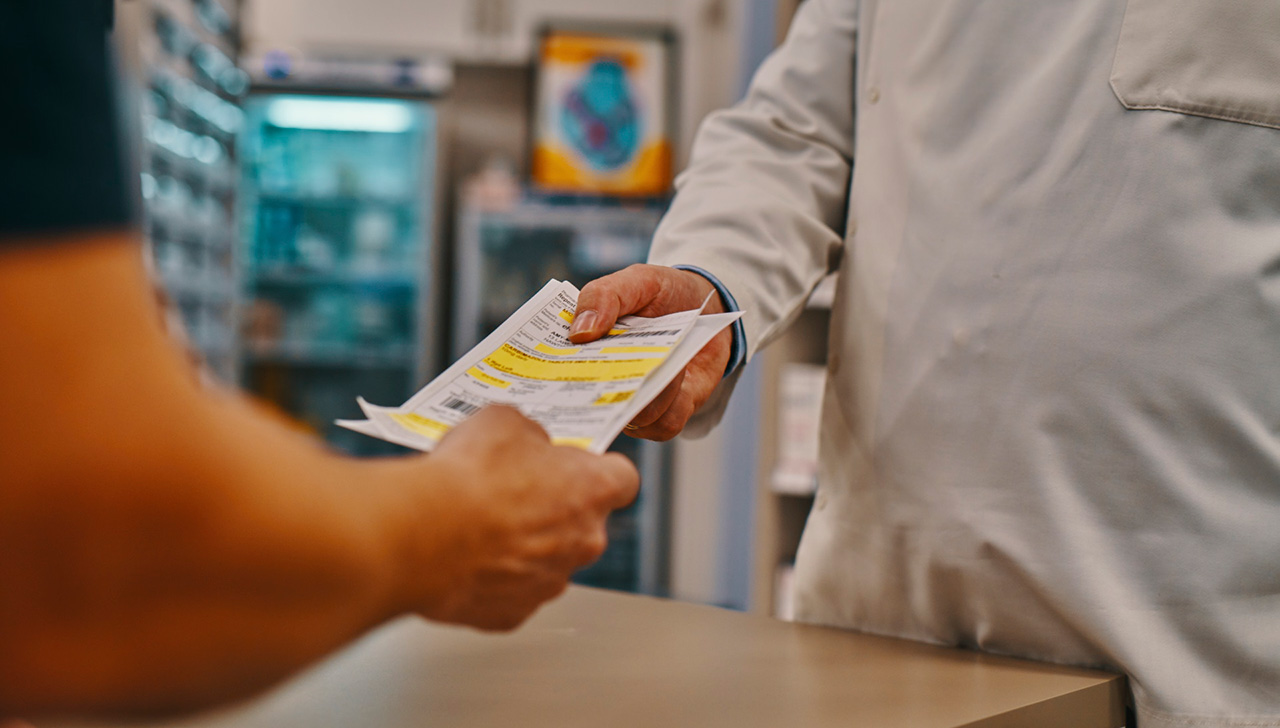
October
As Victoria recovered from its second wave of COVID-19, several big announcements relating to pharmacy practice were unveiled within the 2020–21 Federal Budget. Along with all new medicines recommended by the Pharmaceutical Benefits Advisory Committee (PBAC) to be listed on the PBS, funding for the 7CPA was secured in the Budget, providing $18.3 billion for the delivery of medicines and patient-focused programs.
Acting PSA President Michelle Lynch praised the announcement, and said the $2.8 billion investment over 4 years would improve Australians’ access to medicines.
‘The guaranteed listing of all new medicines recommended by the PBAC gives patients certainty that new and lifesaving medicines are available on the PBS,’ she said.

November
The news that the world had been waiting for finally arrived in November, with reports of successful COVID-19 vaccine trials conducted by Pfizer/BioNTech and Oxford/AstraZeneca.
Of the development, Minister Hunt said: ‘Subject to approval, this means that Australians are very much on track for first vaccines in March.’
It was also announced that pharmacists would be involved in the rollout of the COVID-19 vaccine, according to the new COVID-19 Vaccination Policy.
The PSA’s General Manager of Policy and Program Delivery Chris Campbell MPS said PSA embraced the opportunity for pharmacists to play a role in COVID-19 vaccinations.
‘The PSA welcomes the addition of mandatory recording of the COVID-19 immunisation to the Australian Immunisation Register, as well as the requirement for active monitoring for adverse effects following immunisation,’ he told AP.
In medicines safety news, NSW was set to join Tasmania and Victoria by implementing a real-time prescription monitoring system, as outlined in the 2020–21 NSW Budget.
Electronic prescriptions also reached NSW, with the rollout taking place across metropolitan Sydney.
December
In the last month of a very busy year for pharmacists, PSA continued to advocate an expansion of pharmacist vaccinations via its 2021–22 Pre-Budget Submission to the Victorian Government.
The PSA Victorian Branch President John Jackson said that pharmacists should be able to administer the pneumococcal, varicella zoster and influenza type B vaccines, as well as the upcoming COVID-19 vaccine.
‘Pharmacists have been immunising in Victoria since June 2016 and have demonstrated that they have the skills and competence necessary to do so,’ he said.




 ‘We’re increasingly seeing incidents where alert fatigue has been identified as a contributing factor. It’s not that there wasn’t an alert in place, but that it was lost among the other alerts the clinician saw,’ Prof Baysari says.
‘We’re increasingly seeing incidents where alert fatigue has been identified as a contributing factor. It’s not that there wasn’t an alert in place, but that it was lost among the other alerts the clinician saw,’ Prof Baysari says.


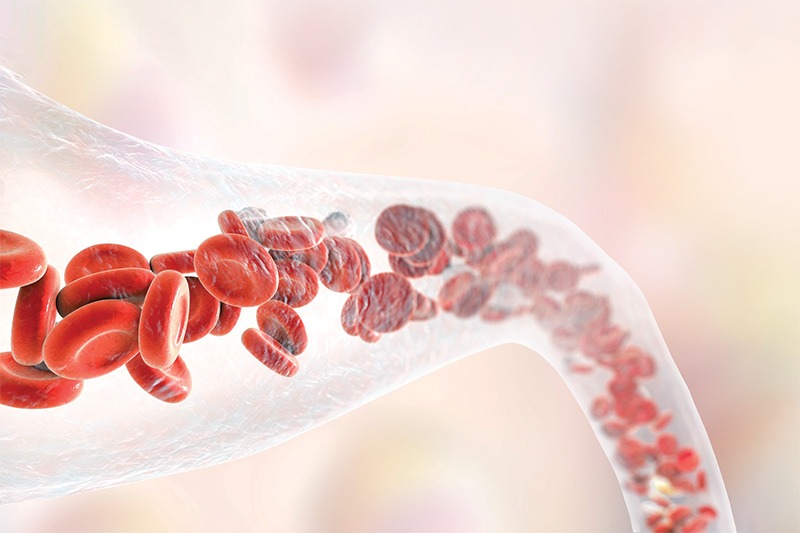 Beyond the arrhythmia, AF often signals broader pathological processes that impair cardiac function and reduce quality of life and life expectancy.5 Many of these conditions are closely linked to social determinants of health, disproportionately affecting populations with socioeconomic disadvantage. Effective AF management requires addressing both the arrhythmia and its underlying contributors.4
Beyond the arrhythmia, AF often signals broader pathological processes that impair cardiac function and reduce quality of life and life expectancy.5 Many of these conditions are closely linked to social determinants of health, disproportionately affecting populations with socioeconomic disadvantage. Effective AF management requires addressing both the arrhythmia and its underlying contributors.4  C – Comorbidity and risk factor management
C – Comorbidity and risk factor management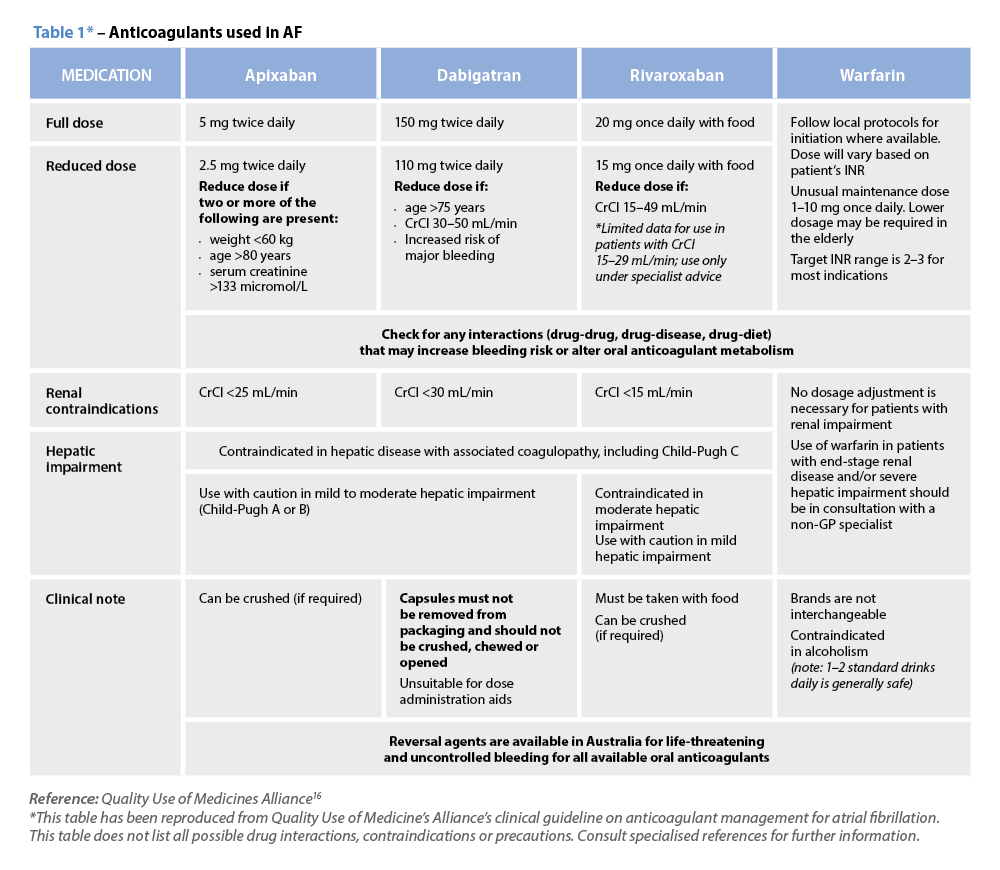 Warfarin
Warfarin




